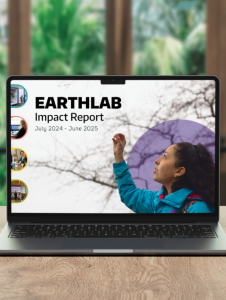 SEATTLE, WA – November 13, 2025
SEATTLE, WA – November 13, 2025
The University of Washington’s EarthLab released its second annual impact report today, documenting fiscal year 2025 achievements in community-centered environmental research and action. The report highlights how trust-based partnerships are driving climate solutions across Washington state.
“This past year has reminded me that everything we do begins with trust,” said Phil Levin, Interim Executive Director of EarthLab. “Trust is what makes progress possible — not just in science, but in community, and in one another. In a time when so many are questioning institutions and struggling to believe that collective progress is still possible, I’ve seen how powerful it can be when people choose to trust — to stay in conversation, to share power, and to build solutions together.”
Key Highlights from Fiscal Year 2025 (July 1, 2024-June 30, 2025):
Training and Mentoring Tomorrow’s Climate Leaders
EarthLab’s Summer Internship Program continues to see strong demand among UW undergraduate applicants, with a roughly 5% acceptance rate reflecting significant student interest in hands-on climate justice work. In partnership with the Program on the Environment, EarthLab co-sponsored an environmental justice seminar that consistently fills the classroom with students.
EarthLab also expanded NextGen Narratives, a blog series written by and for UW students exploring what equitable climate action and hope can look like. Students pitch story ideas, work with professional editors, and publish their perspectives to over 23,000 newsletter subscribers — building valuable portfolio pieces while amplifying diverse voices on climate futures.
Investing in Research Co-Created with Community
After five years of the Innovation Grants Program — which has awarded nearly $2M to 29 teams — EarthLab conducted a comprehensive program evaluation to inform its future direction.
In early 2026, EarthLab will launch two new funding opportunities designed to meet different needs and timescales, enabling the organization to support both deep relationship building and rapid responses to urgent environmental challenges.
This year’s Innovation Grants Program case study highlights the Coastlines – Camera – Action project in North Cove, Washington. Following community-led restoration of 1.1 miles of shoreline by the Shoalwater Bay Indian Tribe, Willapa Erosion Control Action Now (WECAN), and Wash Away No More, UW researchers and North Cove community members received a 2023 EarthLab Innovation Grant to enhance monitoring systems and amplify resident voices in coastal research. The grant upgraded photo monitoring stations, and community members have since submitted over 700 photos revealing storm-by-storm changes that would otherwise be undetectable through traditional seasonal monitoring methods. The project received additional two-year funding from Washington Sea Grant in winter 2025.
Expanding What Is Possible for Environmental Research & Action
Like mycelium sharing resources across a forest network, EarthLab’s shared services model connects over 130 researchers and staff across multiple research centers to the university resources they need to thrive.
This infrastructure has proven essential during one of the most challenging periods for climate research funding. When research teams lost federal awards with little warning in early 2025, EarthLab’s finance and administration team helped them rapidly pivot. Becca Hart, EarthLab’s Grants Manager, worked alongside researchers to identify new funding opportunities and submit proposals within weeks, allowing vital community partnerships to continue.
Last year, EarthLab’s finance and administration team supported member organizations in submitting 23 proposals, saving researchers an estimated one to two months of work annually. That’s valuable time back that researchers can instead spend in communities, conducting fieldwork, and advancing climate solutions.
“My role is to be the bridge, or the shield, or the filter — depending on the day — between researchers and the bureaucracy of the UW, state, and federal governments,” Hart said.
EarthLab also facilitated over 45 collaborative events this year, creating spaces for researchers, policymakers, and community partners to build the relationships and trust needed for meaningful climate action.
Creating Connections at UW and in Community
EarthLab met with more than 30 groups across the UW and worked with a consultant to better understand how its summer internship program could serve both student learning and community needs.
EarthLab and its member organizations brought together more than 4,000 academics, policymakers, students and community partners tackling challenges from ocean chemistry changes to wildfire response to climate change health impacts.
Following the devastating Los Angeles wildfires in January 2025, EarthLab helped the Center for Health and the Global Environment (CHanGE) organize a two-hour hybrid event connecting L.A. area experts with Washington state practitioners. The event brought together policymakers at local, county and state levels, UW students and faculty, and community members to share lessons learned for future collaboration.
“In the aftermath of a disaster, there’s not time to develop relationships, ideas and trust,” said Dr. Nicole Errett, center director of the UW Center for Disaster Resilient Communities. “Events like these are essential to creating a foundation that will allow us to collaborate to address scientific challenges when events like these occur in Washington.”
Looking Ahead
“Federal support for the climate and environment is shrinking, but local and regional leadership is growing,” Levin noted. “Across the Northwest and beyond, people are transforming uncertainty into action — finding new paths toward connection, justice, and care. The most meaningful progress rarely happens in isolation; it comes when people work side by side, grounded in respect, humility, and trust.”
EarthLab is doubling down on its strategic plan, renewing focus on equity, partnership, and action. We have a big vision to grow our programs and impact over the next several years. If our work resonates with you, we need your support.
If you would like the plain text version of the FY 2025 Impact Report, click here.
About EarthLab
EarthLab at the University of Washington connects researchers, communities, and students to address pressing environmental challenges through collaborative, community-centered approaches. Through its shared services model, EarthLab supports a network of research centers, manages competitive grant programs, and trains the next generation of environmental leaders. EarthLab’s work is grounded in trust, equity, and the belief that transformative solutions emerge when diverse knowledge systems and communities work together.